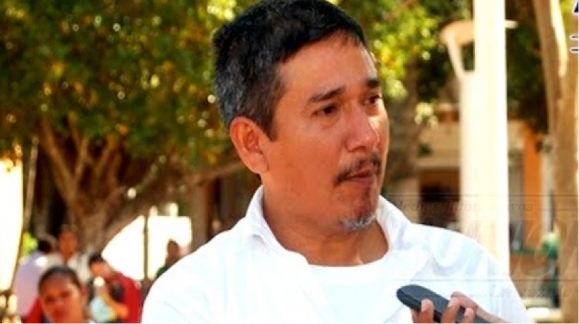News magazine Proceso first published this article on January 2, 2015. This article is about former Governor César Duarte of Chihuahua. Duarte is one of eight former governors in Mexico who are wanted for corruption, among other charges. Unlike the other seven governors, Duarte is still on the run and has not been arrested.
Good investigative journalism about corruption in Mexico exists but is sometimes hard to come by. The simplicity with which Mayorga tells a complex story — one that weaves together confidential and anonymous sources along with freedom of information requests and corresponding contracts and other documents — about corruption in Mexico is one of the reasons this article deserves translation. The fact that Duarte has so far escaped justice demonstrates Mayorga’s article is still timely, still relevant. The power of Mayorga’s investigative journalism reminds us why she is one of Mexico’s threatened journalists.
Mayorga’s article has been translated in anticipation of her receiving the Committee to Protect Journalists’ Press Freedom Award this November. The Mexican Journalism Translation Project will translate more work by Patricia Mayorga into English in the coming weeks and months so that readers who do not readily speak Spanish can familiarize themselves with the work of this brave Mexican journalist. At least 11 journalists have been murdered in Mexico in 2017. – PT

The Health Sector: César Duarte’s Goldmine
By Patricia Mayorga (PROCESO)
Complaints and accusations are piling up against the governor of Chihuahua, César Duarte Jáquez. Charges have been filed against Duarte at the federal Attorney General’s office for embezzlement, corruption, overstepping his powers as governor, and misappropriating funds: he transferred state resources to a bank where he holds shares. Duarte now faces conflict of interest charges for giving state business to certain companies that supply Chihuahua’s health sector and to which he has ties.
CHIHUAHUA, Chih. (Proceso). – In 2011 — and two months after being sworn in as governor — César Horacio Duarte Jáquez of Chihuahua entered into an arrangement with Ymmarsa Pharmaceutica, S.A. de C.V. and Servicios y Atenciones Médicas K. Thanks to him these companies became the state health sector’s top suppliers. Duarte showered them directly with million-peso contracts – in spite of complaints against them for selling overpriced drugs. Duarte’s registered tax address for his not-for-profit and his business is also the same address used by these medical supply companies.
Duarte shares the tax address at 8725 Periferico de la Juventud in the Lomas Universidad neighborhood in Chihuahua with Servicios y Atenciones Médicas K (Farmacias Economik). Duarte’s business, Union Ganadera División del Norte and his not-for-profit Que el Cielo Bendiga a Chihuahua are also domiciled at this address. The not-for-profit was only just registered with Mexico’s Institute for Industrial Property.
Ymmarsa Pharmaceutica’s directors work out of the governor’s business office, even though the company’s address is 11368 Rudyard Kipling Street in the Chihuahua Industrial Complex (“Complejo Industrial Chihuahua”). The directors put the governor’s business office address on their business cards.
A scandal already surrounds Duarte for transferring state resources to the Progreso de Chihuahua Bank, where he is also a shareholder. Attorney Jaime García Chávez and the PAN-ista legislator Rocio Reza Gallegos have filed complaints against Duarte for embezzlement, corruption, misappropriating funds and overstepping his powers. Forty senators and thousands of citizens who have established an anti-Duarte movement back García Chávez and Reza Gallegos. They filed their complaints at the federal Attorney General’s Office.
The pharmaceutical companies present a different sort of case, this time about conflict of interest and favoritism to businesses. Between 2011 and 2013 the health sector spent almost 3 billion pesos (about USD$161million) purchasing drugs, according to the Transparency and Access to Information Law (“Ley de Transparencia y Acceso a la Información”).
Eduardo Almeida Navarro owns both Ymmarsa Farmacias Economik and Administración y Comercialización de Franquicias Internacional, S de RL de CV. Almeida Navarro belongs to the PRI, Duarte’s party, and he backed Duarte’s election campaign. In 2011, 2012, and 2013 more than half of the state budget for purchasing medicines and medical supplies went to Almeida Navarro’s pharmacies. The 2014 expenditures are not yet public.
Since Duarte became governor the state’s expenditure on pharmaceuticals has increased by 32 percent or 301.9million pesos, about US$16 million. Yet state health centers noticeably lack stocks of drugs and medical supplies. The state auditor (“Auditor Superior del Estado,” acronym in Spanish: ASE) has reported that warehouses lack appropriate stock controls.
Audits indicate that businesses linked to Duarte fail to fulfill requirements, or other suppliers file complaints against them showing that their medicines are priced significantly higher than their competitors. And yet still their bids win government tenders.
One group of citizens – supported by doctors who suspected conflict of interest and misappropriation of funds – requested an investigation by the federal Ministry for Public Performance (“Secretaría de la Función Pública”). The Ministry turned down their request, arguing that the correct agency is the state comptroller. But former PRI legislator Liz Aguilera García runs the state comptroller’s office. Aguilera García is close to Duarte and may run as a candidate for Mexico’s federal Congress.
On November 28, 2014, these citizens – and with Proceso already aware of their complaint – filed another before federal auditors. Its received a status of “study and analyze.” In this document citizen petitioners accuse the government of colluding with officials from the health sector and violating the Law of Acquisitions, Leases, Service Contracts and Public Works and the Law of Responsibility for Chihuahua’s State Public Servants.
More Money, Less Stock
The alliance between these pharmacy companies meant that the Chihuahua’s Ministry of Health increased its medicine budget. From 2011 to 2013 the budget surged by about 190 million pesos (around USD$10million).
A summary of the budget document obtained under the Transparency Law makes it apparent that State Health Services spent about 3 billion pesos just on buying drugs and medical supplies. Chihuahua’s Institute of Health (acronym in Spanish, ICHISAL) also manages the federal health program Seguro Popular and it spent around 600 million pesos on similar items for the state pension system, around 1.5million pesos (US$80,000).
However, in one of the most used hospitals for people with Seguro Popular, there have been significant shortages in drugs and medical supplies since 2013. The last available report states that between 2013 and July 2014 no month went by when stock exceeded 90 percent. Instead, for those nineteen months average stock rates were around 58 percent. In previous administration, even with a smaller budget, public officials say the average stocking level hovered around 80 percent.
Some experts cannot believe the increased spending on medicine. “This situation needs to be compared against population increase (…). The previous administration barely covered eight percent of the state’s population. But the current administration covers 45 percent of Chihuahua’s population. The point is that they haven’t taken into account that half of the people in Chihuahua have access to federal health insurance through IMSS [meaning they don’t need duplicated coverage from Seguro Popular],” says an official speaking on condition of anonymity because he is close to Chihuahua’s health minister Pedro Hernández Florez.
There’s a difference of opinion over what is going on: “Maybe they are buying at too great a cost, making poor purchasing choices, or overcompensating after they look at the lack of supply in the hospitals, perhaps both of these things are happening. Buying poorly comes from defective analysis of statistical reports about illnesses. Or, that the reports have not been given appropriate consideration. The favored supplier is given priority and they sell through an intermediary seeking maximum profit, expending minimum effort. The drug might be about to exceed its expiration date or maybe it is not used that frequently.
So, he says, auditors find it difficult to uncover poor practices because they are not doctors trained in administration. He says that when Hernández Flores took up the position the situation worsened.
Another high-level collaborator from the Ministry of Health said on condition of anonymity that the state health sector had taken on these supplies though intermediaries instead of contracting out supply separately and directly with their makers, something that would result in big savings. “Basing drug supply on intermediaries goes against cost saving and opens the door to corruption,” he told Proceso.
Shady Businesses
Ymmarsa and Servicios y Atenciones Médicas K are apparently one and the same. Their partners are the same, they work out of the same offices and they buy medicine and medical supplies from different laboratories at low cast and in bulk. But when these businesses began to supply the state in 2011 they were not prepared to sell to its public health sector, nor that of other states where they have contracts.
Two brothers, Juan Hiram and Jorge Márquez Rodríguez opened Economik Pharmacies as a family business in Durango in 2004. In 2011 they created Ymmarsa Pharmaceutica so they could supply the public sector. Juan Hiram took the business on and invited Jesús Miguel Robles Villareal to be his partner.
“They had drugs stored on the floor or exposed to the light, even though they are meant to be in a controlled environment. They operated like that for a year until the State Commission for the Prevention of Risks to Health (acronym in Spanish: COESPRIS) put a stop to it,” asserts one of the company’s administrative employees speaking under condition of anonymity. State auditors confirmed this situation in their 2012 audit.
One administrative employee interviewed in the offices located at Periférico de la Juventud says it is the location where they deal with the contracts as they see fit: “A week before announcement of a request for proposals they prepared everything they would need to compete. That’s what they stuck to because they were the ones who set the contracts’ terms. The government sent them contracts and they dealt with them however they wanted.”
Ymmarsa took control over the pharmacy franchises belonging to Economik in 2011. These had sprung up as a family business in Durango. They opened 7 stores there. They started out in Chihuahua in 2011. Today there are nine branches in Chihuahua City, Parral, Ciudad Juárez and Cuauhtémoc.
When somebody asks for Servicios y Atenciones Médicas K at 8725 Periférico de la Juventud the inquiry first goes to Jesús Miguel Robles Villareal, one of the Ymmarsa partners. This person—who handed over a business card for Médicas K at the same address as the governor’s business, even though the company is registered at 11368 Rudyark Kipling Street—said an agreement existed over the registered tax address.
When asked for an interview with one of the people in charge of Médicas K Robles Villareal suggested contacting its legal representative. The lawyer failed to respond to the request. People consulted by Proceso and familiar with the company confirm that it’s the same but is using a different name (Ymmarsa and Médicas K).
Robles Villareal denies any relationship with Unión Ganadera División del Norte, established by Duarte in 2005. “We even had problems with them over parking, but we don’t have anything to do with them,” he asserts then adding, “they pay the rent.”
Ymmarsa – which supplies both the pension systems for the state of Chihuahua and the city of Chihuahua – stands accused of inflating prices by 300 percent and still winning contracts. There are complaints from Chihuahua, Tabasco and Durango; Nuevo León rescinded a contract on June 27, 2014.
The state auditor found that for fiscal years 2012 and 2013 the state Ministry of Health poorly distributed drugs, and did not have control over warehouses or when supplies expired, something that implicated Médicas K . Even so the State Congress unanimously approved the Médicas K account.
The state’s health services directly have handed over at least 500 million pesos (about US$26 million) to Médicas K since 2012. This year alone it received 321.1million pesos (about US$17 million) for drugs and medical supplies for Seguro Popular. That’s what contract D250517 indicates under direct tender 282/2012.
In 2013 while Médicas K received 183.5 million pesos (US$9.8 million) because it supplies the Ministry of Health, other suppliers received only between 106,000 (US$5,600) and 600,000 pesos (US$32,000) and only one other supplier received as much as 68 million pesos (US$3.6 million), according to freedom of information request 087242014.
In 2012 the state auditor commented to Chihuahua’s Health Services for awarding this company contracts D20517 and D20518 worth 417.5 million pesos (US$23 million) without putting them first out to tender. The state’s Health Services awarded the contracts even though the company, Médicas K, did not have the required health license.
Ymmarsa also has its own history. In 2012, Marketing Medicinal and others suppliers complained publicly that the state pension scheme awarded this Durango-based company a contract for 345 million pesos (US$18 million), even though they inflated their prices. Of the 881 drugs and medical supplies the pension agencies needed, Marketing Medicinal provided 738 of them, meaning that it controlled more than 80 percent of the drugs and other items supplied under contract LP002012.
The complaints from other suppliers offer more examples. Ymmarsa bid 1,503 pesos for each of the 700 boxes of Bicalutamida (to treat prostate cancer) even though distributor México Hospitalaria bid 500 pesos for the same drug. For Fenitoína (an anti-epileptic) Ymmarsa bid 394 pesos per box even though Laboratorio Pisa bid 14 pesos. Ymmarsa won the bid for Prozac, an anti-depressant, at 398 pesos per box when the year before it cost 7.50 pesos.
The other suppliers complain that fraud costs the state at least 100 million pesos (US$5.4 million). These companies allege that Ymmarsa was not even asked for a letter to show that it does not have a history of failing to fulfill contracts, as contract requirements state. But Ymmarsa cannot show this type of letter because the company was created in 2011 and it has never supplied public health agencies.
For Chihuahua City’s municipal pension scheme 67% of the drugs are overpriced.
In 2012, Marcelo González Tachiquín, current education minister and who served as director of the pension system, confirmed that he had fired the person in charge of purchasing, Edgar Hermes Sandoval Tarín. However, Sandolva Tarín did not leave the agency until August 2014.
And Prosalud, Too
The third favored provider is Administración y Comercialización de Franquicias Internacional—known as Prosalud. It belongs to Grupo ALSA. Eduardo Almeida Navarro owns the holding company. He donated to Duarte’s gubernatorial campaign. The businessman owns a Cessna 402 plane with license number N3403. In June 2014 he was nominated as the PRI’s president in the city.
Grupo ALSA is made up of seven firms. Three supply the state government and Chihuahua’s city government: Construcciones Corporativas Inmobiliarias, SA de CV, Comercializadora Corporativa Internacional, SA de CV, and Administración y Comercialización de Franquicias Internacional, S de RL de CV.
These companies are in charge of installing public lighting, renovating buildings, selling machinery, constructing and remodeling schools, and selling pharmaceuticals.
Prosalud provides drugs and medical supplies to Chihuahua’s government. In 2012 the State of Chihuahua paid it 180 million pesos (US$9.6 million). The company’s website indicates that its holding company was created in 2003 and in 2011 it reactivated itself to open the pharmacy Prosalud. It supplies at least nine pharmacies, along with public health providers in Chihuahua: IMSS, ICHISAL, and, of course, the pension agencies.
Investigative reporter Patricia Mayorga is a prize-winning Mexican journalist from Chihuahua. She works with Proceso, Mexico’s premier investigative news magazine. After the murder of her friend and colleague Miroslava Breach in March 2017 in Ciudad Chihuahua, she went into exile and is currently in hiding. The Committee to Protect Journalists will honor her with its Press Freedom Award this November.
Translator Patrick Timmons is human rights investigator and lawyer, and a journalist. His articles have appeared in the Texas Observer, CounterPunch, NACLA, Foreign Policy in Focus, and Horizontal.mx. In September he provided freelance coverage of the Mexico City earthquake for ITN’s News at Ten, ITV London’s Good Morning Britain, and The Daily Telegraph. Timmons collaborates with the Freedom of Expression Project at the Transborder Institute at the University of San Diego. He is participating in #agendadeperiodistas, a new group formed by journalists to protect journalists. He lives in Mexico City.




